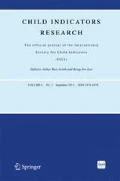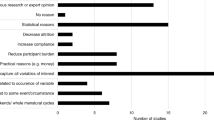Abstract
Thus far, daily diary studies have mostly focused on adults and adolescents, while only a few have researched young children. In this methodological article, we introduce and evaluate a mobile diary application, “You have a message from Illi”, designed to capture young, under-school-age children’s daily experiences at home and in day care, in the context of a 24 h economy where parents work nonstandard hours and child care is arranged accordingly. We also compare childrens’ mood ratings reported by both the children themselves and adults. Children recruited either from day care centers (N = 15) or day and night and care centers (N = 17) carried smartphones with them for 1 week and reported their daily moods and activities three times a day by mobile phone as motivated by “Illi”, a fairy-tale character. The questions concerned daily activities, moods and transitions as well as good and challenging moments. The study demonstrated children’s ability and motivation to participate in a mobile diary and produce valuable information about their daily lives. The method captured fluctuations in children’s daily moods, as reported by both children and adults. The mood evaluations of adults and the children themselves correlated. Parents and day care staff perceived participation in the mobile diary study as practical, relevant and not over-demanding, and that the method was easy to integrate into daily life.
Similar content being viewed by others
References
Bolger, N., Davis, A., & Rafaeli, E. (2003). Diary methods: capturing life as it is lived. Annual Review of Psychology, 54, 579–616.
Clark, A. (2005). Listening to and involving young children: a review of research and practice. Early Child Development and Care, 175, 489–505.
Connelly, M., & Bickel, J. (2011). An electronic daily diary process study of stress and health behavior triggers of primary headaches in children. Journal of Pediatric Psychology. doi:10.1093/jpepsy/jsr017.
Cremin, H., & Slatter, B. (2004). Is it possible to access the ‘voice’ of pre-school children? Results of a research project in a pre-school setting. Educational Studies, 30, 457–470.
Darbyshire, P., MacDougall, C., & Schiller, W. (2005). Multiple methods in qualitative research with children: more insight or just more? Qualitative Research, 5, 417–436.
Delle Fave, A., & Massimini, F. (2004). Parenthood and the quality of experience in daily life: a longitudinal study. Social Indicators Research, 67, 75–106.
Einarsdóttir, J. (2007). Research with children: methodological and ethical challenges. European Early Childhood Education Research Journal, 15, 197–211.
Finnish Ministry of Social Affairs and Health. (2013). Child and family policy in Finland. Helsinki: Finnish Ministry of Social Affairs and Health.
Gallacher, L.-A., & Gallagher, M. (2008). Methodological immaturity in childhood research? Thinking through ‘participatory methods’. Childhood, 15, 499–515.
Gassman-Pines, A. (2011). Low-income mothers’ nighttime and weekend work: daily associations with child behavior, mother-child interactions, and mood. Family Relations, 60, 15–29.
Halfon, S. & Friendly, M. (2015). Work around the clock. A snaphot of non-standard hours child care in Canada. Childcare Resource and Research Unit Publication. Occasional paper 29.
Hsueh, J. A., & Yoshikawa, H. (2007). Working nonstandard schedules and variable shifts in low-income families: Associations with parental psychological well-being, family functioning, and child well-being. Developmental Psychology, 43, 620–632.
Intille, S. S. (2012). Emerging technology for studying daily life. In M. R. Mehl & T. S. Conner (Eds.), Handbook of research methods for studying daily life (pp. 267–282). New York: The Quilford Press.
Jordan, D. (2008). The ecology of infant and toddler care during nonstandard hours in licenced childcare centers. Doctoral dissertation. Michigan State University.
Lämsä, T., Rönkä, A., Poikonen, P.-L., & Malinen, K. (2012). The child diary as a research tool. Early Child Development and Care, 182, 469–486.
Larson, R. (1989). Beeping children and adolescents: a method for studying time use and daily experiences. Journal of Youth and Adolescence, 18, 511–530.
Larson, R. W., & Almeida, D. M. (1999). Emotional transmission in the daily lives of families: a new paradigm for studying family process. Journal of Marriage and the Family, 61, 5–20.
Laurenceau, J., & Bolger, N. (2005). Using diary methods to study marital and family processes. Journal of Family Psychology, 19, 86–97.
Li, J., Johnson, S., Han, W.-J., Andrews, S., Kendall, G., Strazdins, L., & Dockry, A. (2014). Parents’ nonstandard work schedules and child well-being: a critical review of the literature. The Journal of Primary Prevention, 35, 1–21.
Malinen, K., Rönkä, A., & Sevon, E. (2015a). Mobile diary methods in studying daily family life. In Y. Zheng (Ed.), Encyclopedia of mobile phone behavior (pp. 372–382). Hershey, PA, USA: IGI Global.
Malinen, K., Rönkä, A., Tolvanen, A., Sevón, E., & Jokinen, K. (2015b). A mobile diary method for studying children’s and adolescents’ emotions: a pilot study. Social Inquiry into Well-being, 1, 51–60.
Matthews, M., Doherty, G., Sharry, J., & Fitzpatrick, C. (2008). Mobile phone mood charting for adolescents. British Journal of Guidance and Counselling, 36, 113–129.
Mills, M., & Täht, K. (2010). Non-standard work schedules and partnership quality: quantitative and qualitative findings. Journal of Marriage and Family, 72, 860–875.
Morrow, V. (2005). Ethical issues in collaborative research with children. In A. Farrell (Ed.), Ethical research with children (pp. 150–165). Maidenhead: Open University Press.
Muthén, L. K., & Muthén, B. (1998–2012). Mplus user’s guide (7th ed.). Los Angeles: Authors.
Perrez, M., Schoebi, D., & Wilhelm, P. (2000). How to assess social regulation of stress and emotions in daily family life? A computer-assisted family self-monitoring system (FASEM-C). Clinical Psychology and Psychotherapy, 7, 326–339.
Plowman, L., & Stevenson, O. (2012). Using mobile phone diaries to explore children’s everyday lives. Childhood, 4, 539–553.
Pösö, T. (2008). Kiistanalaiset perhesuhteet ja tutkimisen moraali [Disputable family relationships and the morals in studying]. In E. Sevón & M. Notko (Eds.), Perhesuhteet puntarissa [Considering family relationships] (pp. 93–107). Helsinki: Gaudeamus.
Powell, M., & Smith, A. (2009). Children’s participation rights in research. Childhood, 16, 124–142.
Presser, H. B. (2003). Working in a 24/7 economy: challenges for american families. New York, NY: Russell Sage.
Punch, S. (2002). Research with children. The same or different from research with adults? Childhood, 9, 321–341.
Rönkä, A., Malinen, K., Kinnunen, U., Tolvanen, A., & Lämsä, T. (2010). Capturing daily family dynamics via text messages: development of the mobile diary. Community, Work and Family, 13, 5–21.
Rönkä, A., Malinen, K., Jokinen, K., & Häkkinen, S. (2015). A mobile-assisted working model for supporting daily family life: a pilot study. The Family Journal, 23, 180–189.
Säkkinen, S., & Kuoppala, T. (2011). Lasten päivähoito 2010 [Children’s daycare 2010]. Tilastoraportti [Statistical report] 46. Terveyden ja hyvinvoinnin laitos [National Institute for Health and Welfare].
Sevón, E., Malinen, K., & Rönkä, A. (2014). Daily wellbeing in families with young children: a harmonious and a disharmonious week. Journal of Family Studies, 20, 221–238.
Statham, J., & Mooney, A. (2003). Around the clock: childcare services at atypical times. Bristol: Policy Press.
Strazdins, L., Korda, R. J., Lim, L., Broom, D. H., & D’Souza, R. M. (2004). Around-the-clock: parent work schedules and children’s well-being in a 24-h economy. Social Science & Medicine, 59, 1517–1527.
Strazdins, L., Clements, M. S., Korda, R. J., Broom, D. H., & D’Souza, R. M. (2006). Unsociable work? Nonstandard work schedules, family relationships, and children’s well-being. Journal of Marriage and Family, 68, 394–410.
Verhoef, M., Tammelin, M., May, V., Rönkä, A., & Roeters, A. (2015). Child care and parental work schedules: a comparison between Finnish, British and Dutch parents. Community, Work and Family. doi:10.1080/13668803.2015.1024609.
Whalen, C. K., Henker, B., Jamner, L. D., Ishikawa, S. S., Floro, J. N., Swindle, R., Perwien, A. R., & Johnston, J. A. (2006a). Toward mapping daily challenges of living with ADHD: Maternal and child perspectives using electronic diaries. Journal of Abnormal Child Psychology, 34, 115–130.
Whalen, C. K., Henker, B., Ishikawa, S. S., Jamner, L. D., Floro, J. N., Johnston, J. A., & Swindle, R. (2006b). An electronic diary study of contextual triggers and ADHD: get ready, get set, get mad. Journal of American Academy of Child and Adolescent Psychiatry, 45, 166–174.
Acknowledgments
We are grateful to students Heini Kylliäinen, Sanna Nykänen, Teemu Ahonen and Pasi Pakarinen for their important contribution to the development of the character Illi and the mobile application.
Author information
Authors and Affiliations
Corresponding author
Electronic supplementary material
Below is the link to the electronic supplementary material.
Appendix 1
Figures drawn from the mobile application “Illi” (DOCX 211 kb)
Rights and permissions
About this article
Cite this article
Rönkä, A., Sevón, E., Räikkönen, E. et al. Manuscript: You have a Message from Illi! The Mobile Diary in Researching Children’s Daily Experiences. Child Ind Res 10, 505–523 (2017). https://doi.org/10.1007/s12187-016-9386-y
Accepted:
Published:
Issue Date:
DOI: https://doi.org/10.1007/s12187-016-9386-y




